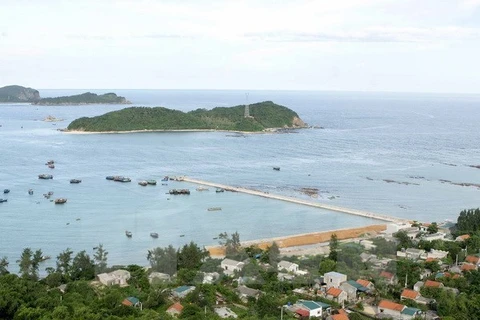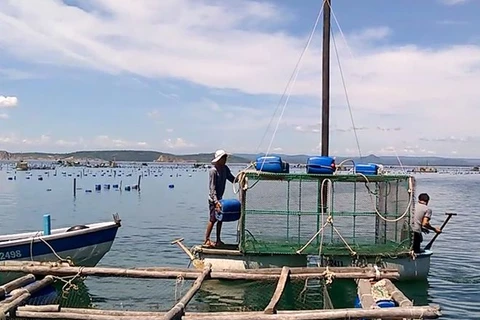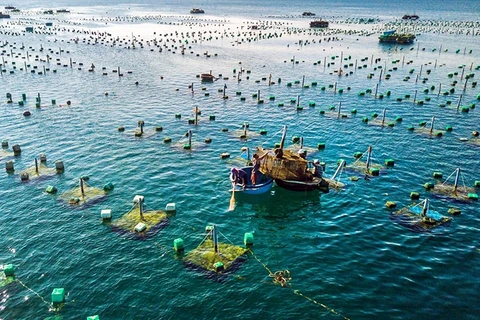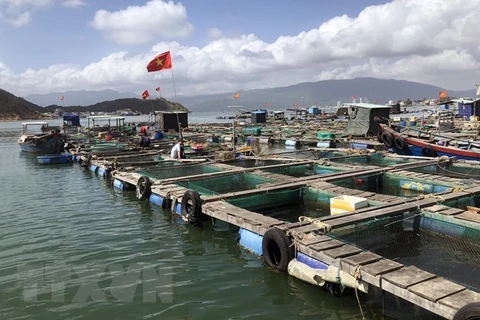Hanoi (VNA) - To deploy a national plan on aquaculture development in the 2021-2030 period, with a vision to 2045, in August 2022, the Prime Minister approved a national programme for aquaculture development in the 2021-2030 period.
The objective is to develop effective and sustainable aquaculture while proactively adapting to climate change; improve productivity, quality, value and competitiveness of aquatic products; and meet the requirements of domestic and export markets, the Nhan dan newspaper reported.
In addition to the above overall goals, the national programme for aquaculture development in the 2021-2030 period also set out many specific goals: By 2030, aquaculture production should reach 7 million tonnes with export revenue of 12 billion USD per year, while the growth rate of aquaculture value is expected to reach an average of more than 4.5% a year. Specifically, in the next eight years, more than 50 aquaculture areas and concentrated seed production areas will receive investment while essential infrastructure will be upgraded to meet production requirements.
Over the years, Vietnam has built a value chain of pangasius. So far, it has been effective and has set the goal that by 2030, Vietnam will actively produce and supply more than 70% of the demand for tiger prawn and whiteleg shrimp and 100% selected brood stock; at the same time, it will improve the quality of breeding aquatic species with high economic value and large volume of commodity products.
Vietnam has also invested in upgrading aquaculture infrastructure, at the same time developing production systems, supplying materials and aquaculture supporting industries.
Currently, the Ministry of Agriculture and Rural Development is developing a decree on a number of policies on fisheries development, according to which mechanisms and policies on infrastructure investment in seed production and aquaculture development. The central budget will invest 100% of funds for building essential infrastructure in concentrated aquaculture areas, marine aquaculture areas, and concentrated aquatic seed production areas for marine aquaculture.
The national programme for aquaculture development in the 2021-2030 period is clearly an important step to develop from small-scale fisheries to large, sustainable commodity production and an indispensable trend when Vietnam is aiming to be one of the leading seafood production and processing centres in the region and world.
Overcoming numerous challenges, 2022 was the second year in which Vietnam's seafood industry implemented this programme, with many positive signals, as all targets have exceeded the set level. In particular, the export value reached a record level in history - reaching the milestone of nearly 11 billion USD, up 23.8% over the same period in 2021.
To date, the marine farming area has reached about 9 million m³ in cages, while aquaculture production has reached 5.19 million tonnes, an increase of 7% compared to 2021 and also an all-time record high./.
The objective is to develop effective and sustainable aquaculture while proactively adapting to climate change; improve productivity, quality, value and competitiveness of aquatic products; and meet the requirements of domestic and export markets, the Nhan dan newspaper reported.
In addition to the above overall goals, the national programme for aquaculture development in the 2021-2030 period also set out many specific goals: By 2030, aquaculture production should reach 7 million tonnes with export revenue of 12 billion USD per year, while the growth rate of aquaculture value is expected to reach an average of more than 4.5% a year. Specifically, in the next eight years, more than 50 aquaculture areas and concentrated seed production areas will receive investment while essential infrastructure will be upgraded to meet production requirements.
Over the years, Vietnam has built a value chain of pangasius. So far, it has been effective and has set the goal that by 2030, Vietnam will actively produce and supply more than 70% of the demand for tiger prawn and whiteleg shrimp and 100% selected brood stock; at the same time, it will improve the quality of breeding aquatic species with high economic value and large volume of commodity products.
Vietnam has also invested in upgrading aquaculture infrastructure, at the same time developing production systems, supplying materials and aquaculture supporting industries.
Currently, the Ministry of Agriculture and Rural Development is developing a decree on a number of policies on fisheries development, according to which mechanisms and policies on infrastructure investment in seed production and aquaculture development. The central budget will invest 100% of funds for building essential infrastructure in concentrated aquaculture areas, marine aquaculture areas, and concentrated aquatic seed production areas for marine aquaculture.
The national programme for aquaculture development in the 2021-2030 period is clearly an important step to develop from small-scale fisheries to large, sustainable commodity production and an indispensable trend when Vietnam is aiming to be one of the leading seafood production and processing centres in the region and world.
Overcoming numerous challenges, 2022 was the second year in which Vietnam's seafood industry implemented this programme, with many positive signals, as all targets have exceeded the set level. In particular, the export value reached a record level in history - reaching the milestone of nearly 11 billion USD, up 23.8% over the same period in 2021.
To date, the marine farming area has reached about 9 million m³ in cages, while aquaculture production has reached 5.19 million tonnes, an increase of 7% compared to 2021 and also an all-time record high./.
VNA
























